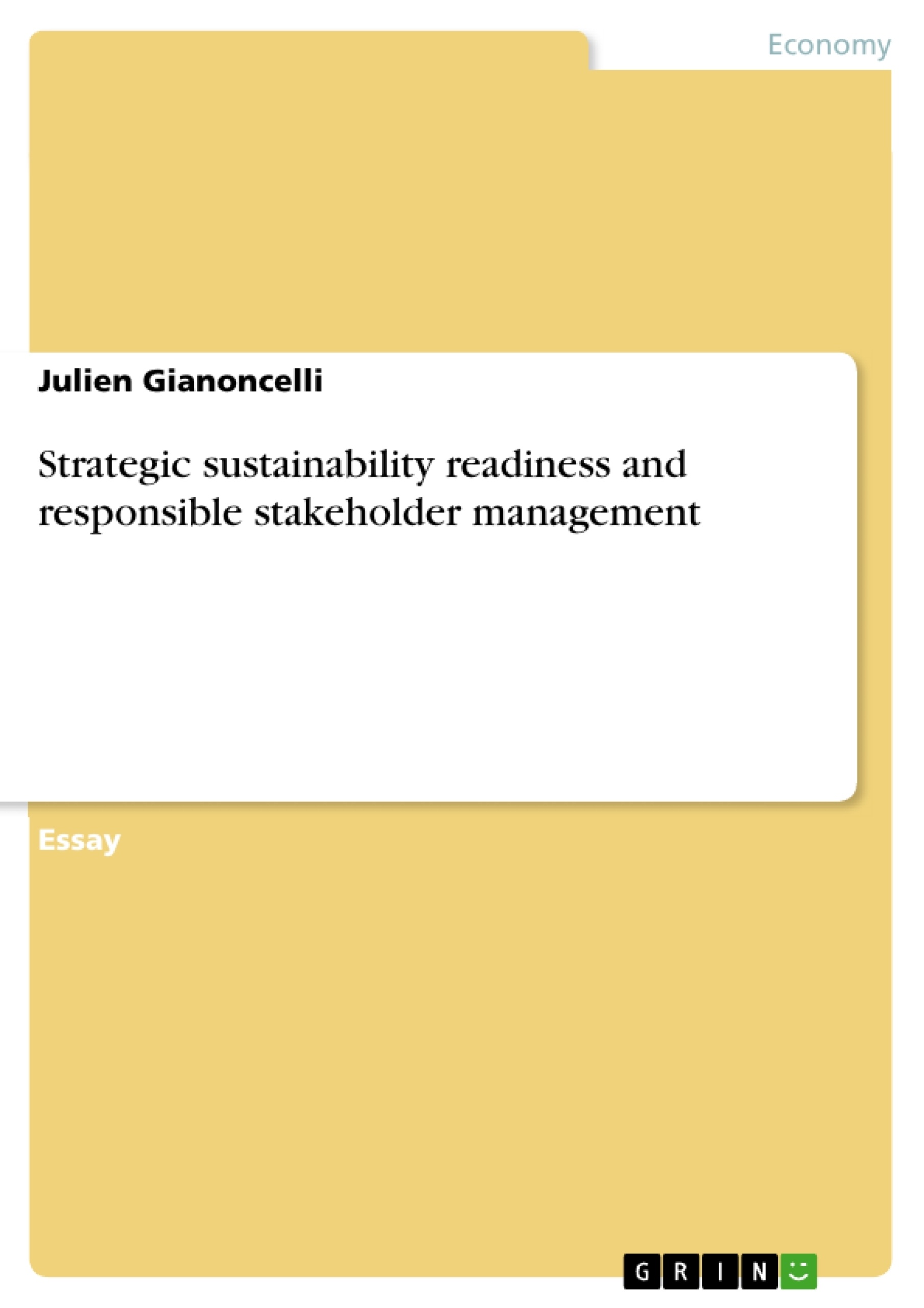With society becoming ever more aware of sustainability and organisations realising their responsibility in these terms, it is necessary to look deeper into organisational strategy and practice.
This essay shall discuss possible organisational approaches to achieving strategic excellence in this fundamental challenge of the current century. It will examine the premises for strategic readiness and organisational self-understanding as well as the effects of close stakeholder management to find that responsiveness, embodied management and dialogue is vital for strategic success. For illustration, the business case of Naturata AG will be consulted.
Inhaltsverzeichnis (Table of Contents)
- Introduction
- A short historic view on the matter
- Finding the own role in the discourse
- Sense of self as basis for sustainability
Zielsetzung und Themenschwerpunkte (Objectives and Key Themes)
This essay examines the concept of strategic sustainability readiness and responsible stakeholder management within organizations. It explores the importance of integrating sustainability into organizational strategy and practice, highlighting the need for a holistic approach that goes beyond compliance and cost-cutting measures. The essay also delves into the significance of organizational self-understanding and the role of stakeholder management in achieving strategic sustainability excellence.
- Strategic sustainability readiness and its importance for organizational success
- The need for a holistic understanding of sustainability beyond compliance and cost-cutting
- The role of stakeholder management in achieving strategic sustainability excellence
- The significance of organizational self-reflection and re-invention in the context of sustainability
- The impact of organizational decisions on social, ecological, and financial capital
Zusammenfassung der Kapitel (Chapter Summaries)
The introduction highlights the growing awareness of sustainability and the need for organizations to critically analyze their efforts in this area. It discusses the evolution of sustainability from a marketing trend to a core strategic imperative. The essay then explores the historical context of sustainability discourse, outlining the emergence of various initiatives and frameworks, such as the ISO 14000 series and the United Nations Global Compact. It argues that these standardized processes, while valuable, are insufficient to address the magnitude of environmental challenges and require a more holistic approach.
The chapter "Finding the own role in the discourse" focuses on the importance of organizational self-reflection and re-invention to achieve strategic sustainability excellence. It presents a model of five stages of corporate social responsibility development, emphasizing the need for organizations to align their sustainability practices with their core values and purpose. The chapter also highlights the complexities of defining and implementing sustainability strategies and the importance of building knowledge capacities within organizations.
The section "Sense of self as basis for sustainability" emphasizes the interconnectedness between organizations and their environment. It argues that every organizational action has an impact on the environment and vice versa, affecting not only financial capital but also social and ecological capital. The chapter emphasizes the importance of understanding and managing these impacts across all dimensions, highlighting the need for a sense of responsibility and foresight.
Schlüsselwörter (Keywords)
The key concepts explored in this essay include strategic sustainability readiness, responsible stakeholder management, organizational self-understanding, holistic sustainability, stakeholder engagement, corporate social responsibility, environmental impact, social capital, ecological capital, and strategic excellence.
Frequently Asked Questions
What is "strategic sustainability readiness"?
It refers to an organization's capacity to integrate sustainability into its core strategy and self-understanding, moving beyond simple compliance.
Why is stakeholder management vital for sustainability?
Responsive management and continuous dialogue with stakeholders ensure that organizational decisions align with social and ecological capital needs.
Which business case is used for illustration in the essay?
The business case of Naturata AG is consulted to demonstrate successful strategic sustainability practices.
What are the five stages of corporate social responsibility development?
The essay discusses a model where organizations evolve their CSR efforts to align sustainability practices with their core values and purpose.
How do organizational decisions impact different types of capital?
Decisions affect not only financial capital but also social and ecological capital, requiring a holistic sense of responsibility and foresight.
- Citation du texte
- Julien Gianoncelli (Auteur), 2016, Strategic sustainability readiness and responsible stakeholder management, Munich, GRIN Verlag, https://www.grin.com/document/341629



